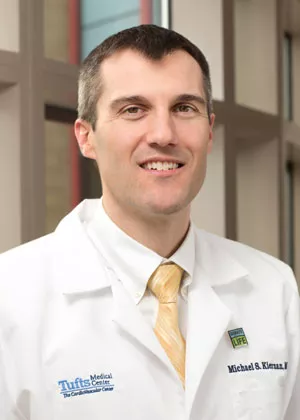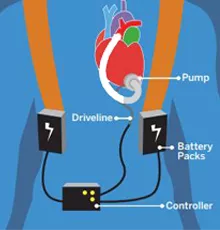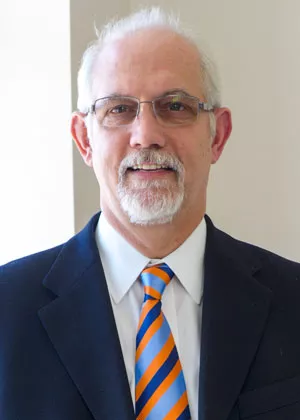Despite this, the father to two young girls stayed busy working 12-hour shifts at the hospital and playing several sports in his spare time. He and his wife Shonda, also a nurse, shared in the parenting responsibilities as they balanced their full plates.
One hot summer day, Jeff reported for his regular shift at the hospital’s ICU, where he eventually was admitted as a patient with severe abdominal pain. After many tests, an echocardiogram revealed he was in severe heart failure.
The diagnosis
“We were shocked as we listened to my doctor explain the intense pain was caused by fluid that had collected in my abdomen because my heart wasn’t working correctly,” recalled Jeff. “He said there was not much he could do for me at that point, and I should go immediately to Tufts Medical Center because they’re the best.”

An ambulance transported Jeff to Tufts MC in Boston where specialists tried different treatments to encourage Jeff’s heart to pump. A few days later, Jeff and his family learned his heart hadn’t responded to treatments and he was at the “end stage” of heart failure. Jeff needed a new heart; his name was placed on the heart transplant list at Tufts MC.
“Unfortunately, ‘end-stage’ heart failure has a worse prognosis than many other diseases,” explained Michael Kiernan, MD, MS, Director of the Ventricular Assist Device Program at Tufts MC.
“However, we are able to surgically implant a Left Ventricular Assist Device (LVAD) in certain patients to assist the heart in pumping until they receive a new heart or, for some patients who are not candidates for heart transplantation, indefinitely.”
An LVAD to “Bridge” the Wait

The team identified Jeff as a candidate for an LVAD to serve as a “bridge” while he waits for a new heart. Dr. Kiernan and his team carefully explained to Jeff and Shonda how an LVAD works. They also told them that it takes serious commitment for the patient and caregiver, and they would need to work closely with the medical team to achieve the best results. Best results could mean being able to do many of the activities people without heart failure can do.
Jeff and Shonda agreed an LVAD was the next best step and scheduled the surgery. Just a few weeks later, Gregory Couper, MD, Surgical Director of the Advanced Heart Failure Program at Tufts MC, performed the surgery on Jeff and implanted the LVAD.

“I remember waking up in the critical care area and everyone kept checking on me, including Dr. Couper and Dr. Kiernan,” said Jeff. “I was in critical care for eight days, longer than expected, and my whole family and I were so well taken care of by Tufts.”
Once out of critical care, Jeff moved to another floor at the medical center where his recovery continued and he and Shonda learned more about how to take care of his LVAD. The Tufts MC LVAD team even brought in actual LVADs filled with water to demonstrate how the device works.
Going home
“The team went over every single thing with us while I was in the hospital, trained us really well and taught us what to do if there was ever an emergency,” Jeff said. “Going home was a very nerve-wracking time, but we felt like we were really prepared and we knew we could call them at any hour with questions.”
It took Jeff a few months for his body to adjust to the device. During that time, he spoke to the Tufts MC LVAD team often and came back into Boston for minor adjustments.
After about three months, Jeff said he “felt like a new person and actually better than I had in a decade.”
While Jeff anxiously waits for the call for his new heart, the Tufts MC LVAD team closely monitors him. He comes in for regular appointments and often speaks to members of the LVAD team on the phone.
“The team is top-notch and really made this process so much easier,” said Jeff. “They think about everything and they are there for my whole family, including my young daughters. They’re like my family—they’re awesome.”
He hasn’t been able to return to work and he’s enjoying his family time while at home. Each weekday morning, Jeff wakes up his daughters, drives them to and from school, takes the dog for long walks and prepares the family’s meals. They recently went to a trampoline park and the movies, and one of his girls said they had never seen him so awake.
A new plan
Jeff’s experience has changed his life in countless ways, including his new plan to return to school, become a nurse practitioner and support patients with advanced heart failure.
“I’ve met many heart transplant and LVAD patients at Tufts who come back to visit and I see how valuable it is to speak with people who know what you’re going through,” Jeff said. “I want to use this second chance I have to the best of my ability, become a medical provider and help people who are going through what I am.”
The cause of Jeff’s heart failure remains uncertain. What he does know is that he feels “really, really good now” and that he is “in the best hands with the team at Tufts MC.”